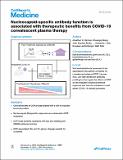| dc.contributor.author | Herman, Jonathan D | |
| dc.contributor.author | Wang, Chuangqi | |
| dc.contributor.author | Burke, John Stephen | |
| dc.contributor.author | Zur, Yonatan | |
| dc.contributor.author | Compere, Hacheming | |
| dc.contributor.author | Kang, Jaewon | |
| dc.contributor.author | Macvicar, Ryan | |
| dc.contributor.author | Taylor, Sabian | |
| dc.contributor.author | Shin, Sally | |
| dc.contributor.author | Frank, Ian | |
| dc.contributor.author | Siegel, Don | |
| dc.contributor.author | Tebas, Pablo | |
| dc.contributor.author | Choi, Grace H | |
| dc.contributor.author | Shaw, Pamela A | |
| dc.contributor.author | Yoon, Hyunah | |
| dc.contributor.author | Pirofski, Liise-anne | |
| dc.contributor.author | Julg, Boris D | |
| dc.contributor.author | Bar, Katharine J | |
| dc.contributor.author | Lauffenburger, Douglas | |
| dc.contributor.author | Alter, Galit | |
| dc.date.accessioned | 2023-02-03T17:44:51Z | |
| dc.date.available | 2023-02-03T17:44:51Z | |
| dc.date.issued | 2022 | |
| dc.identifier.uri | https://hdl.handle.net/1721.1/147862 | |
| dc.description.abstract | Coronavirus disease 2019 (COVID-19) convalescent plasma (CCP), a passive polyclonal antibody therapeutic agent, has had mixed clinical results. Although antibody neutralization is the predominant approach to benchmarking CCP efficacy, CCP may also influence the evolution of the endogenous antibody response. Using systems serology to comprehensively profile severe acute respiratory syndrome coronavirus 2 (SARS-CoV-2) functional antibodies of hospitalized people with COVID-19 enrolled in a randomized controlled trial of CCP (ClinicalTrials.gov: NCT04397757), we find that the clinical benefits of CCP are associated with a shift toward reduced inflammatory Spike (S) responses and enhanced nucleocapsid (N) humoral responses. We find that CCP has the greatest clinical benefit in participants with low pre-existing anti-SARS-CoV-2 antibody function and that CCP-induced immunomodulatory Fc glycan profiles and N immunodominant profiles persist for at least 2 months. We highlight a potential mechanism of action of CCP associated with durable immunomodulation, outline optimal patient characteristics for CCP treatment, and provide guidance for development of a different class of COVID-19 hyperinflammation-targeting antibody therapeutic agents. | en_US |
| dc.language.iso | en | |
| dc.publisher | Elsevier BV | en_US |
| dc.relation.isversionof | 10.1016/J.XCRM.2022.100811 | en_US |
| dc.rights | Creative Commons Attribution-NonCommercial-NoDerivs License | en_US |
| dc.rights.uri | http://creativecommons.org/licenses/by-nc-nd/4.0/ | en_US |
| dc.source | Elsevier | en_US |
| dc.title | Nucleocapsid-specific antibody function is associated with therapeutic benefit from Covid-19 Convalescent plasma therapy | en_US |
| dc.type | Article | en_US |
| dc.identifier.citation | Herman, Jonathan D, Wang, Chuangqi, Burke, John Stephen, Zur, Yonatan, Compere, Hacheming et al. 2022. "Nucleocapsid-specific antibody function is associated with therapeutic benefit from Covid-19 Convalescent plasma therapy." Cell Reports Medicine, 3 (11). | |
| dc.contributor.department | Massachusetts Institute of Technology. Department of Biological Engineering | en_US |
| dc.relation.journal | Cell Reports Medicine | en_US |
| dc.eprint.version | Final published version | en_US |
| dc.type.uri | http://purl.org/eprint/type/JournalArticle | en_US |
| eprint.status | http://purl.org/eprint/status/PeerReviewed | en_US |
| dc.date.updated | 2023-02-03T17:33:19Z | |
| dspace.orderedauthors | Herman, JD; Wang, C; Burke, JS; Zur, Y; Compere, H; Kang, J; Macvicar, R; Taylor, S; Shin, S; Frank, I; Siegel, D; Tebas, P; Choi, GH; Shaw, PA; Yoon, H; Pirofski, L-A; Julg, BD; Bar, KJ; Lauffenburger, D; Alter, G | en_US |
| dspace.date.submission | 2023-02-03T17:33:24Z | |
| mit.journal.volume | 3 | en_US |
| mit.journal.issue | 11 | en_US |
| mit.license | PUBLISHER_CC | |
| mit.metadata.status | Authority Work and Publication Information Needed | en_US |
